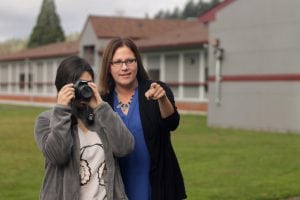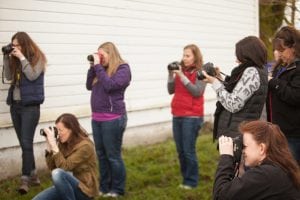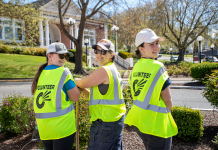Alison Clinton of Horizon Photo loves taking photos. But she likes to teach others how to take photos as well.
“Education is important,” she explains. “You have to know how your camera works. The best thing is learning what your camera can do and not just setting it on auto.”
Clinton teaches a class for adults through Horizon Photo, something she has been doing the past six or seven years. “A lot of moms and grandparents take those classes. They have nice cameras and want to take better photos of their kids or family events, but don’t know how.”

Clinton plans to hold classes in the spring or summer. “A lot of people get nice cameras for Christmas and want to learn how to use them,” she explains. The classes are small, around 10 to 12 people. “We don’t go into a ton of technical stuff, but a little. We talk about posing, getting expressions out of kids, exposure and finding light. Light can make or break a photo. Classes last three or four hours normally on a Sunday. Afterward we go out and everyone gets to practice what they’ve learned by taking photos. They end up knowing they can go into a lighting situation, like at a sporting event, and know how to set the camera geared toward action.” Students always walk away with a laminated cheat sheet with information about things like shutter speed and apertures.
Clinton also offers an advanced class for more experienced students, or will teach two classes back-to-back if there are enough interested students. “Some students take the class two or three times and finally say, ‘Ohhh, I get it now.’ That’s my favorite part of teaching. When it really starts making sense to them. Knowing how a camera works is foreign to most people, it’s not something you typically learn in school. And I know I’m biased, but it’s a cool thing to learn about,” she smiles.
Clinton recently began teaching photography full time at W.F. West High School in Chehalis after about a 10-year hiatus. “I love teaching photography at the high school,” Clinton beams. Things have changed a bit since she taught there last. “The dark room was taken out not long after I left. Industry-wise, about 99 percent of photographers don’t shoot film anymore. But there is a little bit of a cult-like comeback for it now,” she explains.

Another thing that has changed is the massive use of digital cameras. Clinton is a little sad about that. “I can’t open up a digital camera to show students the insides so they can see how it works. But I have a few old SLR film cameras just so I can do that. I’m nostalgic for the dark room, but that isn’t a skill they need for real-world employability now.”
Since the class is a Career and Tech Ed class, meant to teach students vocational skills in order to get a job, real-world skills matter. When asked about jobs in the field, Clinton advises, “It really depends on area and the type of photography you’re going into. Portraits will always be around. There will always be babies and marriages and graduations to photograph. Other types of photography depends on your location and how hard you work on improving your skills.”
“In this class we work on the technical aspects of how the camera works. We talk about what affects the image. But it’s also about opening a whole new world for them, so they can be that artist. It’s not just about getting lucky with a picture.” Students also learn how to use the software to process photos. “I teach a little about Photoshop, but it is mostly geared toward graphic designers. So we mainly spend time learning and using Adobe Lightroom. It is specifically geared toward photographers.” Students learn how to do simple edits, and also how to organize files and images. “That’s always difficult for people,” Clinton says. “Even the adults.”

“I feel very lucky to have been hired on at W.F. West, getting to build the program. Right now it’s basic, but I’m hoping to offer more advanced classes like photojournalism, and getting students more involved in documenting school life. Things like that. There really is a lot of room to grow.”
Clinton is also quick to share that you can learn about your camera on your own. “There are a lot of resources out there,” she says. “There are many free online classes as well.”
If you are interested in taking one of Clinton’s classes through Horizon Photo, you can like her on Facebook or message her, and get on her email list. She recommends letting her know quickly when she posts on the Facebook page. “The classes fill fast so I don’t advertise anywhere else,” she says. “I can’t push the education enough. You’re creating a photo not just taking a picture. Your camera is a tool to make that happen.”
Horizon Photo & Design
PO Box 868
Centralia, WA 98531
360-269-3790












































